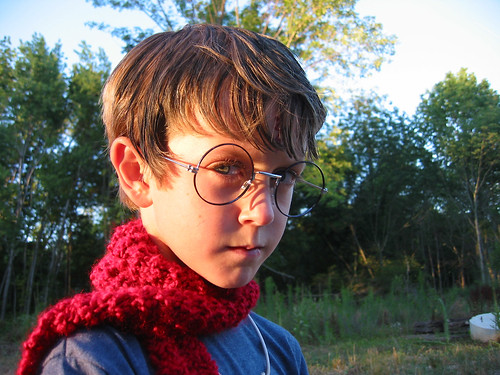
{My nephew as Harry Potter. Photo by rocketlass}
As my annual family vacation followed a week that I began with two posts about children's books, and as Stacey and I were looking forward to capping the vacation with a midnight Harry Potter party in the company of our eight-year-old nephew, it probably comes as no surprise that I read some children's books during the trip.
No, I haven't read Harry Potter and the Deathly Hallows yet; from the moment just after midnight when we were handed it at the very pleasant Treehouse Books in Holland, Michigan, until 4:15 this morning, Stacey was buried in it. She says she stopped reading at 4:15 because
I started thinking about how very weird it is that we look at this set of little marks on a page, and they make words, and then those words make a story. That got very distracting, so I decided that meant it was time for bed.Meanwhile, my mother, waking up at 3:00 and going to check that we'd all made it back from the bookstore, saw her and said,
A-ha. I thought so.

{Stacey as Nymphadora Tonks. Photo by rocketlass}
The children's books I read instead were older, and accompanied by considerably less hooplah. In the comments at The Dizzies last week, I weighed in on the side of Lloyd Alexander regarding the question of whether his Chronicles of Prydain are better than Susan Cooper's Dark Is Rising sequence--but I realized that my confidence was somewhat inappropriate, as I'd not read the Prydain books since childhood. So in the car on the way to the house we were renting for the week, I blazed through the first of the series, The Book of Three (1964).
I was surprised at how little of the plot I remembered, especially as so many of the characters remained so vivid. The more mysterious characters must have resonated with me most strongly as a boy, for they're the ones I remember most clearly. When Taran and Lord Gwydion were captured by the evil sorceress Achren, her terrifying seductiveness rushed back whole into my mind, as if I'd tapped a cobwebbed keg containing my actual memories of reading the book as a boy; her mix of femininity, ruthlessness, and power must have mightily addled my adolescent brains. Gurgi's appearance had a similar, if less powerful, effect, reminding me of how much I was entertained by him when I first read the books--though it has to be admitted that he's a character who wears better on pre-teens than on adults. He remains fun, but I now understand a bit better why the adults in the book get frustrated with his wheedling and yammering.
The one character whom I'd almost totally forgotten was the young princess, Eilonwy (Yet I remembered Taran clearly--evidence, should any have been needed, that I was not a preteen girl when I first read the book?). Not that I had forgotten her existence, or her role in the series--instead, I'd forgotten her essence: she's weird. She shares all her rambling thoughts (including her frank opinions--the headline for this post is from Eilonwy's mouth) and she makes odd leaps of logic and intuition. I don't remember quite how she develops in the following books--except that she retains her bravery while growing nicely into leadership--but in The Book of Three her most entertaining and endearing characteristic is her tendency to invent strange, yet apt metaphors. Here's a batch from throughout the book:
I know it isn't nice to vex people on purpose--it's like handing them a toad.
You can't just sit there like a fly in a jug.
[Petting this fawn] is lovely; it makes you feel all tingly, as if you were touching the wind.
You've been carrying that harp ever since I met you, and you've never once played it. That's like telling somebody you want to talk to them, and when they get ready to listen, you don't say anything.
It's silly to worry because you can't do something you simply can't do. That's worse than trying to make yourself taller by standing on your head.
I can't stand people who say, "I told you so." That's worse than somebody coming up and eating your dinner before you have a chance to sit down.
Other than recovering Eilonwy for me, what this reading has revealed is that The Book of Three, though great fun, isn't even in the same league as Over Sea, Under Stone, the first book of Susan Cooper's sequence. But one book is insufficient evidence by which to judge a whole series--Over Sea, Under Stone is by far Cooper's best book, while I remember the emotional power of the Prydain Chronicles growing along with Taran as he meets new people and spends more time with the ones we've met already. Before I can render a proper judgment, I'll have to reread the rest of the Prydain books, which I'll likely do over the next several months. I'll let you know how it goes.
Tomorrow (or possibly Monday), I'll write about the other children's book I read on vacation, which was a birthday gift from my friend Maggie, giver of impeccably chosen gifts: Dodie Smith's I Capture the Castle (1948).
No comments:
Post a Comment